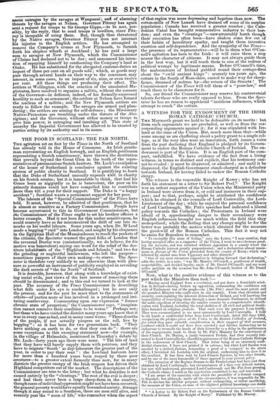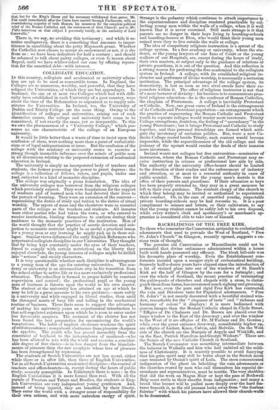A WITNESS FOR THE ENDOWMENT OF THE IRISH ROMAN CATHOLIC
CHURCH.
Tan Maynooth grant we hold to be defensible on its merits : but from such arguments we are precluded, as well as from the cor- responding arguments against it ; for it was stipulated with Ire- land at the time of the Union. But, much more than that—while • some among us are chaffering about a paltry grant to a single col- lege, as if the very idea were an innovation, forth issues a voice from the past declaring that England is pledged by its Govern- ment to endow the Roman Catholic Church of Ireland. The en- dowment is part of the Union. It is an English part of the com- pact, unfulfilled. We have evidence of the fact from a living witness, in terms so distinct and explicit, that his testimony can- not be evaded : it must be disproved, or admitted ; and until it be disproved, the English Government stands charged as a defaulter towards Ireland, for having failed to endow the Roman Catholic cler
* "A Letter to Sir Robert Peel on the Endowment of the Roman Catholic Church of Ireland. By the Knight of Kerry." Published by Mr. Murray.
•
Tile witness is the venerable Knight of Kerry ; who has set- forth his statement in a letter to Sir Robert Peel.* The Knight was an ardent supporter of the Union when the Ministerial party in Ireland were averse from it, or cold and insincere in their sup- ' port ; and to that, perhaps, might be attributed the confidence i which he obtained n the councils of Lord Cornwallis' the Lord- Lieutenant of the day ; while he enjoyed the personal confidence of Lord Castlereagh. Mr. Pites speeches had indicated a liberal policy towards the Catholics ; the Protestants in Ireland were afraid of it, apprehending danger to their ascendancy were English influences brought too much within the field that they monopolized; while the feeling that any change might be for the better was probably the motive which obtained for the measure the good-will of the Roman Catholics. This fact it may not be amiss for Repealers to remember. " To exemplify this state of feeling," says the Letter, " I may mention, that having accepted office as a supporter of the Union, I went to two elections pend- ing the measure, and was returned without opposition in a county where the ; Roman Catholic interest greatly preponderated; and a declaration almost unani- mous in favour of the Union proceeded from the county of Kerry; which was followed by similar ones from Tipperary and other districts."
"One of my most strenuous supporters in bringing forward that declaration," adds the writer, in a note, "was Mr. Maurice O'Connell, a gentleman of wealth, respectability, and decided loyalty, uncle of Mr. Daniel O'Connell; and my most active partisan on the occasion was Mr. John O'Connell, brother of Mr. Daniel O'Connell."
Now, what is the positive evidence of this witness as to the part which the Ministers then took T-- " Having saved England from a revolution, and put down a formidable rebel- lion in Ireland—having broken up opposition, commanding the confidence not
only of Parliament but of the people—he [Mr. Pitt] stood the most potent and the proudest Minister who could exist in any country. From that elevation and security, contemplating the inherent distraction of Ireland, and well knowing the impossibility of remedying them through a mere domestic Parliament, he devised the noble expedient of elevating the smaller country by a comprehensive identifi- cation with England, including the total abolition of all civil and political disabi- lities founded on religious grounds. That such were his purposes I can They were communicated to me most unreservedly by Lord Cornwallis. I ho in my hands a confidential letter from Lord Castlereagh, dated 22d June 180 recognizing the pledges given at the Union to the Roman Catholics of Ireland, for which they gave valuable consideration in their support of that measure,
(without which it could not have been carried,) and further instructing me to
endeavour to reconcile the heads of their hierarchy to a delay in the performance of the engagements made to them by Mr. Pitt's Ministry for the endowment of their Church. Dr. Moylan, a justly venerated Prelate, had then recently inti- mated to Lord Cornwallis the cheerful acquiescence of the Roman Catholic Bishops in the endowment of their Church. That letter being of an extremely confi-
dential character, I have not printed it in extenso; but when Lord Sandon was assailed by a clericalfurioso, demanding a proof of a 'compact' to the above effect, I furnished his Lord.sbip with the original, authorizing him to show it to his assailant. It has been read by Lord Francis Egerton, by two other friends, and by one of the most honourable of those opposed to your present policy.
"The extension of the Regium Donum to the Presbyterians had been just then obtained by Lord Castlereagh; but circumstances of a then very delicate nature, but now well understood, prevented Lord Castlereagh and Mr. Pitt from pressing the Catholic claim: I acted on the negotiation committed to me, and succeeded.
"I am aware of the casuistry with which the possibility of a formal compact is disputed: but although, under all the circumstances, it was impossible for 131r. Pitt to disclose his ulterior purposes without endangering, or rather sacrificing, the measure of the Union, no man of the slightest politial knowledge can doubt
that, but for the Ring's illness and his necessary withdrawal from power, Mr. Pitt could immediately after the Union have carried through Parliament, with an overwhelming majority of both Houses, his measures for the complete political relief of the Roman Catholics and the endowment of their Church; and to Mr. Pitts intentions on that subject I personally testify, on the authority of Lord Cornwallis' ."
There is, we say., no avoiding this testimony; and while it re- mains undisproved, there is a something that amounts to imper- tinence in squabbling about the petty Maynooth grant. Whether the Catholics now choose to accept an endowment or not, it is due from us : we have been defaulters for half a century ; and should be ashamed to talk about paltry colleges, or even to reason about Repeal, until we have whitewashed our case by offering repara- tion for the unsettled debt—with interest.



























 Previous page
Previous page